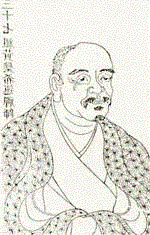Quelle: The Zen Teachings of Huang Po (1958), p. 29
Kontext: All the Buddhas and all sentient beings are nothing but the One Mind, beside which nothing exists. This Mind, which is without beginning, is unborn and indestructible. It is not green nor yellow, and has neither form nor appearance. It does not belong to the categories of things which exist or do not exist, nor can it be thought of in terms of new or old. It is neither long nor short, big nor small, for it transcends all limits, measure, names, traces and comparisons. It is that which you see before you - begin to reason about it and you at once fall into error. It is like the boundless void which cannot be fathomed or measured. The One Mind alone is the Buddha, and there is no distinction between the Buddha and sentient things, but that sentient beings are attached to forms and so seek externally for Buddhahood. By their very seeking they lose it, for that is using the Buddha to seek for the Buddha and using mind to grasp Mind. Even though they do their utmost for a full aeon, they will not be able to attain it. They do not know that, if they put a stop to conceptual thought and forget their anxiety, the Buddha will appear before them, for this Mind is the Buddha and the Buddha is all living beings. It is not the less for being manifested in ordinary beings, nor is it greater for being manifest in the Buddhas.
Huangbo Xiyun: Zitate auf Englisch
“When all the Buddhas manifest themselves in the world, they proclaim nothing but the One Mind.”
Quelle: The Zen Teachings of Huang Po (1958), p. 79
Kontext: When all the Buddhas manifest themselves in the world, they proclaim nothing but the One Mind. Thus Gautama Buddha silently transmitted to Mahakasyapa the doctrine that the One Mind, which is the substance of all things, is co-extensive with the Void and fills the entire world of phenomena. This is called the Law of All the Buddhas. Discuss it as you may, how can you even hope to approach the truth through words? Nor can it be perceived either subjectively or objectively. So full understanding can come to you only through an inexpressible mystery. The approach to it is called the Gateway of the Stillness beyond all Activity. If you wish to understand, know that a sudden comprehension comes when the mind has been purged of all the clutter of conceptual and discriminatory thought-activity. Those who seek the truth by means of intellect and learning only get further and further away from it. Not till your thoughts cease all their branching here and there, not till you abandon all thoughts of seeking for something, not till your mind is motionless as wood or stone, will you be on the right road to the Gate.
Quelle: The Zen Teachings of Huang Po (1958), p. 29
Kontext: All the Buddhas and all sentient beings are nothing but the One Mind, beside which nothing exists. This Mind, which is without beginning, is unborn and indestructible. It is not green nor yellow, and has neither form nor appearance. It does not belong to the categories of things which exist or do not exist, nor can it be thought of in terms of new or old. It is neither long nor short, big nor small, for it transcends all limits, measure, names, traces and comparisons. It is that which you see before you - begin to reason about it and you at once fall into error. It is like the boundless void which cannot be fathomed or measured. The One Mind alone is the Buddha, and there is no distinction between the Buddha and sentient things, but that sentient beings are attached to forms and so seek externally for Buddhahood. By their very seeking they lose it, for that is using the Buddha to seek for the Buddha and using mind to grasp Mind. Even though they do their utmost for a full aeon, they will not be able to attain it. They do not know that, if they put a stop to conceptual thought and forget their anxiety, the Buddha will appear before them, for this Mind is the Buddha and the Buddha is all living beings. It is not the less for being manifested in ordinary beings, nor is it greater for being manifest in the Buddhas.
As quoted in Visions from Earth (2004) by James R. Miller, p. 17
“When thoughts arise, then do all things arise. When thoughts vanish, then do all things vanish.”
Quelle: The Zen Teachings of Huang Po (1958), p. 80
The Wan Ling Record of Xiu Pei, quoted in Why Lazarus Laughed: The Essential Doctrine, Zen — Advaita — Tantra (2003) by Wei Wu Wei
